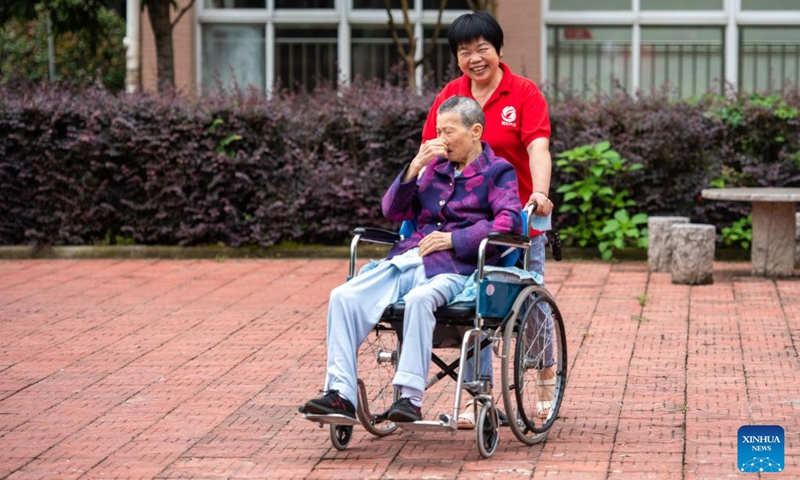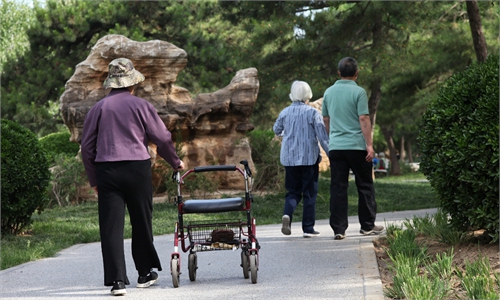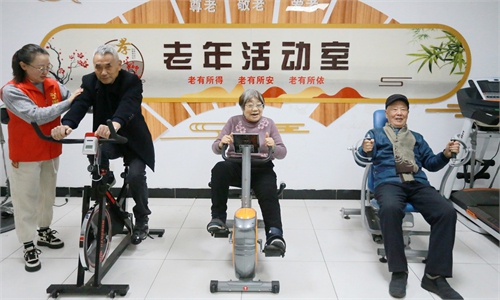

A staff member takes care of a senior resident in a wheelchair at a social welfare center in Hanshou County of Changde City, central China's Hunan Province, June 20, 2023.The city of Changde has scaled up efforts to develop an elderly care service system composed mainly of in-home cares, community services, institutional and medical cares. Photo: Xinhua
Editor's Note: The current intense negative coverage of the Chinese economy by Western media outlets shows that the US-led West is launching cognitive warfare against the Chinese economy, which remains stable and increasingly resilient in the face of headwinds and challenges. Although the "China collapse" rhetoric and other fallacies have been debunked, Western media outlets are relentlessly concocting new terms to discredit the Chinese economy from various perspectives. In response to this coordinated smear campaign, the Global Times is publishing a series of articles to counter this drive. This is the fifth installment in the series.
Recently, as China's population continues to show signs of low birth rates and an overall aging, the foreign media have increasingly been using the subject to disparage the Chinese economy. One of the claims is that Chinese society will face the predicament of "aging before becoming rich," and the aging population issue will hinder China's development. This statement is a far-fetched and inappropriate fallacy with obvious logical errors.
First, both "aging" and "becoming rich" are dynamic processes. Dynamically speaking, the process of population aging in China coincides with the rapid growth and high-quality development of the economy and society, showing the characteristic of "rapidly getting rich as aging."
Second, what is the predicament of "aging before becoming rich"? Generally speaking, it refers to the insufficient accumulation of wealth by the country and society, a flawed social security system, and the lack of preparation for an aging society. In fact, with the gradual improvement of the level of economic development, China has gradually formed a multi-level and multi-pillar new pension insurance system and a well-functioning, appropriately sized, and urban-rural coverage social welfare system.
Population aging is a global issue, and its impact on mankind is profound and long-lasting. From a global perspective, the slowing population growth and aging population are not unique to China.
The global population is entering an era of aging, with the number and proportion of elderly increasing in most countries around the world. According to the United Nations' "World Population Prospects 2022," the growth rate of the population aged 65 and above has exceeded that of the population under 65, and the proportion of the global population aged 65 and above is expected to increase from 10 percent in 2022 to 16 percent by 2050.
Since the start of reform and opening-up, with the rapid development of the economy and society, China has also seen signs of population aging. According to data from the National Bureau of Statistics, by 2022, the number of elderly people increased by 210 million, with an aging level reaching 14.9 percent, entering a moderately aging society.
The improvement of economic development level and the increase of residents' income are the fundamental guarantees for actively responding to the aging society.
In 1978, China's GDP was only 367.9 billion yuan ($50.8 billion), ranking 11th in the world. By 2000, it exceeded 10 trillion yuan, rising to the 6th in the world. In 2010, it surpassed 40 trillion yuan, becoming the world's second-largest economy. In 2023, it exceeded 126 trillion yuan, accounting for about 18 percent of the world's economic aggregate. In recent years, China's contribution to global economic growth has exceeded 30 percent.
With the continuous enhancement of national economic strength, people's living standards have continued to improve, and China has successfully transitioned from a low-income country to an upper-middle-income country. Per capita disposable income, which was 171 yuan in 1978, exceeded 10,000 yuan in 2009, over 20,000 yuan in 2014, and reached 39,218 yuan in 2023. Per capita national income increased from $230 in 1978 to $940 in 2000, reaching $11,950 in 2021.
China's score on the Human Development Index (HDI), which comprehensively assesses a country's development level, has increased from 0.499 in 1990 to 0.788 in 2022, ranking 75th in the world, making China the only country in the world to leap from "low human development level" to "high human development level."
The aging population process is coupled with the current strategy of promoting China's modernization. China's economy has transitioned from an average annual growth rate of about 9.5 percent during the 40 years of reform and opening-up to a new normal of 5-7 percent annual growth, shifting to a stage of high-quality development, transforming economic dynamics, upgrading economic structure, improving economic quality, rapidly enhancing comprehensive strength, and shifting society toward "rapid aging with wealth."
As aging is a basic law of human society, observation is needed on the relationship between "old" and "rich" in Chinese society.
On the one hand, China's economic development started from a low starting point, rapidly taking off on the basis of a large population base, transitioning from a low-income country to a middle-to-high-income country, significantly improving people's living standards, improving the quality of the population, entering the era of informatization and intelligence, narrowing the gap with developed countries in terms of economic and social development level, and making a leap in economic development.
On the other hand, the establishment of a high-quality social security system with Chinese characteristics and the improvement of the social system form the cornerstone for China's sustainable development. It will not only continuously enhance the well-being of all people, effectively guarantee the steady improvement of people's quality of life, but also promote the sustained, coordinated and healthy development of the entire economy and society, making it a solid institutional guarantee for the country's prosperity, national rejuvenation, and happiness.
The author is professor of School of Economics, Nankai University, and director of the Center for Aging Development Strategy at Nankai University. bizopinion@globaltimes.com.cn



